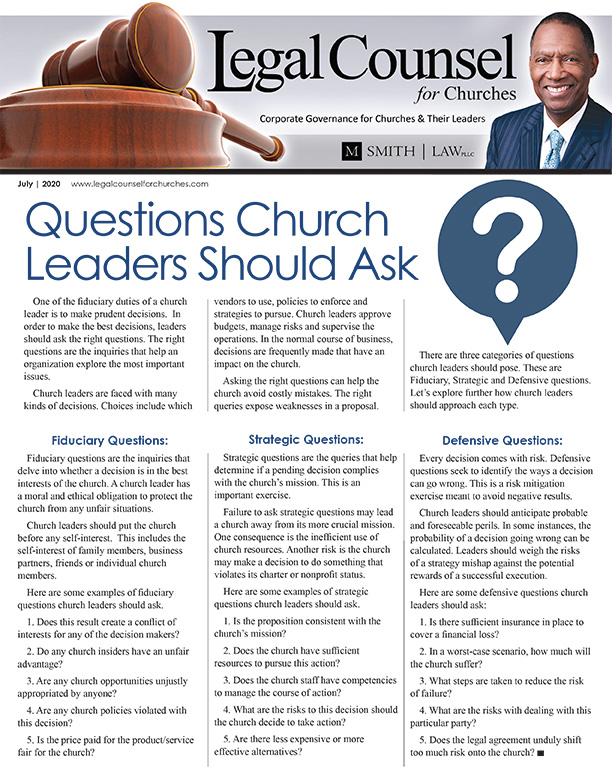One of the fiduciary duties of a church leader is to make prudent decisions. In order to make the best decisions, leaders should ask the right questions. The right questions are the inquiries that help an organization explore the most important issues.
Church leaders are faced with many kinds of decisions. Choices include which vendors to use, policies to enforce and strategies to pursue. Church leaders approve budgets, manage risks and supervise the operations. In the normal course of business, decisions are frequently made that have an impact on the church.
Asking the right questions can help the church avoid costly mistakes. The right queries expose weaknesses in a proposal.
There are three categories of questions church leaders should pose. These are Fiduciary, Strategic and Defensive questions. Let’s explore further how church leaders should approach each type.
Fiduciary Questions:
Fiduciary questions are the inquiries that delve into whether a decision is in the best interests of the church. A church leader has a moral and ethical obligation to protect the church from any unfair situations.
Church leaders should put the church before any self-interest. This includes the self-interest of family members, business partners, friends or individual church members.
Here are some examples of fiduciary questions church leaders should ask.
1. Does this result create a conflict of interests for any of the decision makers?
2. Do any church insiders have an unfair advantage?
3. Are any church opportunities unjustly appropriated by anyone?
4. Are any church policies violated with this decision?
5. Is the price paid for the product/service fair for the church?
Strategic Questions:
Strategic questions are the queries that help determine if a pending decision complies with the church’s mission. This is an important exercise.
Failure to ask strategic questions may lead a church away from its more crucial mission. One consequence is the inefficient use of church resources. Another risk is the church may make a decision to do something that violates its charter or nonprofit status.
Here are some examples of strategic questions church leaders should ask.
1. Is the proposition consistent with the church’s mission?
2. Does the church have sufficient resources to pursue this action?
3. Does the church staff have competencies to manage the course of action?
4. What are the risks to this decision should the church decide to take action?
5. Are there less expensive or more effective alternatives?
Defensive Questions:
Every decision comes with risk. Defensive questions seek to identify the ways a decision can go wrong. This is a risk mitigation exercise meant to avoid negative results.
Church leaders should anticipate probable and foreseeable perils. In some instances, the probability of a decision going wrong can be calculated. Leaders should weigh the risks of a strategy mishap against the potential rewards of a successful execution.
Here are some defensive questions church leaders should ask:
1. Is there sufficient insurance in place to cover a financial loss?
2. In a worst-case scenario, how much will the church suffer?
3. What steps are taken to reduce the risk of failure?
4. What are the risks with dealing with this particular party?
5. Does the legal agreement unduly shift too much risk onto the church?

